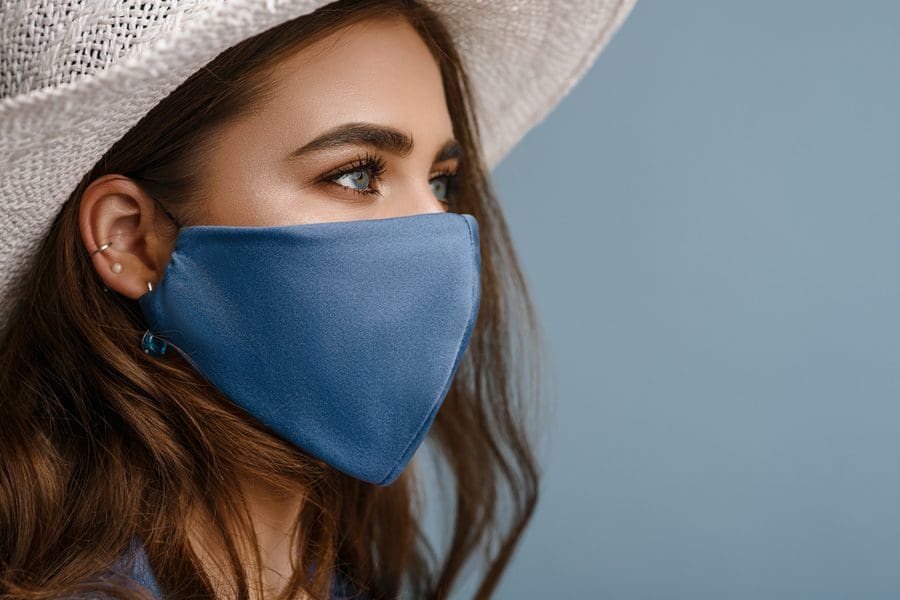As our daily lives in 2020 have been taken over by masks, one inevitable side effect is “maskne,” or acne resulting from wearing a mask like N95 (recommended to be worn by healthcare workers at this time of writing), surgical, or fabric face masks.
What used to be a common skin concern for athletes wearing chin straps and tight helmets is now a problem for many. Factors like breathing moist air, prolonged sweating, and friction from masks rubbing against the skin contribute to irritation and breakouts. If you wear masks for an extended part of your day, the following tips can help keep your skin healthy and protected.
Use the right material
Any mask is better than no mask, but that doesn’t mean you can’t enhance your mask-wearing experience by choosing a mask you will comfortably wear without fuss.
For optimum breathability, look for multi-layered tight woven cotton, cotton-polyester blends, or linen. You should avoid masks made of fleece, nylon, polyester, and rayon, as those materials are more likely to cause irritation and breakouts.
Use a fresh mask each time
If you wear a fabric mask, wash it regularly, and have several masks on hand in case you need to get out of the house at any given time.
According to Lisa Maragakis, Senior Director of Infection Prevention at Hopkins Medicine, it is recommended to clean your cloth mask after every use. The easiest way to wash your mask is to toss it directly into the washer using the warmest water you can for the material, and tumble dry it in the dryer on a high setting – the heat will kill the virus!
If it’s not laundry day, and you really need to sanitize your mask, check out the CDC’s bleach solution. Medical masks are intended to be one-time use, so be sure to properly dispose of it with clean hands. Don’t forget to cut the straps before discarding!
Cleanse and moisturize your skin
Dirt and oil can get trapped under the mask and can contribute to breakouts, so it’s best to wear your mask over a clean, makeup-less face.
If you do need to wear makeup, protect your skin with products that use terms like “non-comedogenic” and “oil free.”
Keep your skincare routine simple: use a gentle soap or facial cleanser and hypoallergenic moisturizer before and after wearing your mask to reduce inflammation and safeguard your skin.
For the best results, apply moisturizer formulated to your skin type immediately after washing your face. When selecting a moisturizer, consider the following:
- Oily skin (or when weather is hot, humid): Gel moisturizer with salicylic acid
- Dry to very dry skin: Cream moisturizer
- Normal or combination skin: Lotion
- Sensitive Skin: Gentle, unscented face lotion with physical sunscreen
Spot treat your maskne
If you have maskne, do not pick at it! Let spots and blemishes heal on their own to prevent scabbing and pigmented scarring. You can also spot treat the pimples with Starface Hydro-Stars Acne Patches (click here), which provide an (adorable) protective seal against bacteria and your fingers.
Remember your sun protection
Use a fabric mask with a rating of UPF 50 or higher, apply sunscreen after your moisturizer, or use a moisturizer that has SPF instilled in its formula. Non-comedogenic sunscreens are preferred because they won’t clog your pores.
Apply sunscreen at least 10 to 15 minutes before sun exposure and use a broad-spectrum sunscreen with a SPF of 30 or higher. La Roche-Posay Anthelios 60 Face & Body Melt In Sunscreen Milk (click here), is great for all skin types.
Call your doctor
If you are taking the above precautions but are still noticing “maskne” or other skin irritations, contact your dermatologist. They can provide an accurate assessment and personalized solution for you.
Keep Wearing Your Mask
While it may be tempting to avoid wearing a mask if you’re experiencing skin irritation or “maskne,” the purpose of wearing masks in public places is to reduce the risk of exposure to coronavirus, which is more important than a few pesky pimples. Protect your loved ones and the community; wear your mask!
If you’re not familiar with basic acne prevention and treatment, check out our post, Best Remedies For Acne, for tips on how to properly address this common skin concern.






